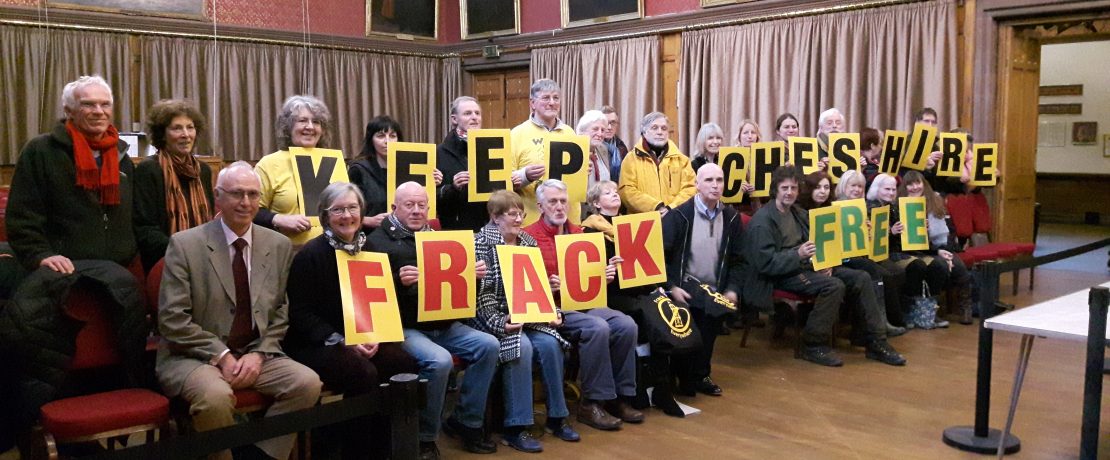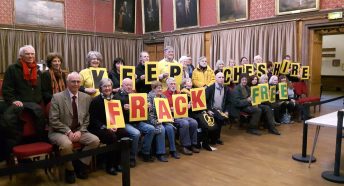Portside North Fracking Inquiry
Jackie Copley was commissioned by Frack Free Ellesmere Port and Upton (the Rule 6 Party) to represent opposition to a shale exploration application. The proposal site is situated on Portside North in Ellesmere Port.
Ms Copley reminded the Inspector that in law the development plan has primacy for decision taking, and that Cheshire West and Chester Council was reasonable to refuse the application by IGas to explore for shale. In cases where proposals are contrary to development plans, only where material considerations indicate otherwise, can applications be approved, and this does not apply in this case. She showed that the planning balance is negative.
The Inspector asked the question “What proportion of the area’s carbon budget would the development account for?” A calculation agreed by Mr Broderick the Council’s climate change expert, and Mr Foster a well-engineer appointed by IGas showed a range of figures, between 20ktonnes and 6ktonnes, worst case scenario half, or best case scenario equal to a fifth the Council’s carbon budget (45kt). The Inspector must acknowledge that due to other oil and gas industries located in Cheshire West and Chester, the total area GHG emissions are comparatively large.
There has been an increasing body of scientific evidence on climate change emerging over the past 6 months and more. Everyone from international bodies to the individual level is obliged to consider and minimise GHG emissions, urgently. IGas throughout the environmental permitting and planning application process has exempted itself from this serious planning issue. In doing so, the Rule 6 Party evidenced how IGas had behaved unprofessionally, indeed irresponsibly. It is not correct as a matter of law or planning policy to entirely ignore the Climate Change Act 2008, or the National Planning Policy Framework (NPPF) and adopted Local Plan policy on development and greenhouse gas emissions. Even when the Council’s cited Local Plan Part One, 2015 Policy STRAT 1: Sustainable Development as the reason for refusal, IGas appealed, yet failed to provide its own climate change expert to counter the issue.
Leaving the monumental issue of climate change for a moment, the recent refusal decision at Roseacre Wood, in Fylde, highlights that shale exploration planning decisions are all about location, location, location. At Preston New Road the Secretary of State concluded that shale exploration was acceptable, yet at nearby Roseacre Wood, it was not. Why was this the case? The location of Roseacre Wood has insurmountable traffic and highway safety issues. So, the Rule 6 party like with Roseacre Wood, provided expert opinion that the Portside North location is unsuitable in planning policy terms.
The negative impacts arising from the proposal outweigh the purported benefits. The only benefit that the Inspector can attribute weight is that to IGas in terms of additional information about gas flow if an “acid queeze” is permitted. There is no evidence that the exploration would yield any other benefit, certainly no benefit to the local community. However, there is considerable expert evidence that the local community would suffer significant and substantial harm.
There was confusion throughout the documents submitted as to whether the application was for an ‘acid wash’, ‘acid squeeze’ or full ‘matrix acidisation’, which involves minor, medium and major stimulation of the geology with minor, medium and major risks, respectively. The Rule 6 Party is trying to stop the development outright, but as without prejudice, for a condition, if approved to limit the process to an ‘acid wash’, with acids and concentrations specified, so that the land use decision maker can make an informed decision. A blowout, however rare, would represent a major threat to the life, and that of health and safety of site operatives, employees in neighbouring premises and residents, including vulnerable groups living nearby.
Another question from the Inspector was “Would a developer/property surveyor consider the proposal site, or other site in the vicinity as a good investment for locating their employment or housing investment if consented as a shale exploration site?” Ms Copley and Mr Plunkett, and economic development expert, agreed that a shale exploration use would definitely have a negative impact on the regeneration ambition of the Council and its development partners. Shale gas exploration would discourage inward development, that would otherwise occur and gross value added associated with new jobs and homes, and this would be contrary to Local Plan Part One, 2015 Policy STRAT 4: Ellesmere Port. Of note, Policy STRAT 4 had emerged since the consent of the Coal Bed Methane exploration at the site. Policy STRAT 4 had also gained planning weight in the past seven years, even during the course of the appeal inquiry. It stemmed from the Strategic Regeneration Framework Vision of 2011, then became adopted Local Plan Part One policy in 2015, then formed part of the Local Plan Part Two submission document, and survived the subsequent examination in September 2018, according to the Main Modifications consultation of January 2019 (closed 3rd February 2019). The Inspector must therefore attribute appropriate weight.
The Rule 6 Party provided expert opinion to show how health and social harm has not been adequately assessed, nor has the geology or ecology by IGas. The Environment Agency was provided with incorrect information on the emissions, distance of sensitive receptors (at three times the distance), and geological assessment from a well at a distance of 8km away from Portside, without reference to faulting or existence of hydrogen sulphide. An important priority mudflat habitat which has RAMSAR and SSSI designation for wintering wildfowl populations is at very close proximity. Which brought into question, the EA’s pollutant-pathway-receptor model, and assessment by Natural England. If the EA has based its permit decision on information that is not robust, then this is clearly of concern to the public. The Chief Medical Officer’s recent report refers to the triple jeopardy that more deprived communities suffer. Rossmore and Netherpool wards already are suffering from poor health and health inequality. Local residents are understandably frightened by the potential harms from exploration of shale at the location. The Rule 6 Party showed the fears are not unfounded, and are in fact completely reasonable and justified.
The misinformation on intended process throughout the submitted environmental permit and planning application, and in the community consultation documentation has given rise to considerable confusion and local concerns. The subsequent variation of permits, submission of planning applications for exploration of shale at wells drilled for Coal Bed Methane at a number of IGas sites has perpetuated widespread mistrust of the developer.
The appellant entirely relies on NPPF Paragraphs 205 and 209 and Written Ministerial Statement, that requires great weight to be given to shale exploration, which the Rule 6 Party accepts must be given weight. However, they do not mandate Mineral Planning Authorities to implement a blanket grant of planning permission to all shale development regardless of where it is to be located or on the balance of harm. Whilst great weight must be afforded to shale exploration, if in the wrong location, with a negative balance this would necessitate, as particular in this case, a refusal.
The Council and IGas will give closing statement next week before the Inquiry closes and the Inspector takes his decision. We trust he will take heed of the experts fielded and skilfully examined by Estelle Dehon Counsel representing the Rule 6 Party. Ms Dehon’s closing statement is available to view below.
Full write-ups of each day of the Inquiry are available at the website of an independent reporter, https://drillordrop.com/ .
Downloads:





